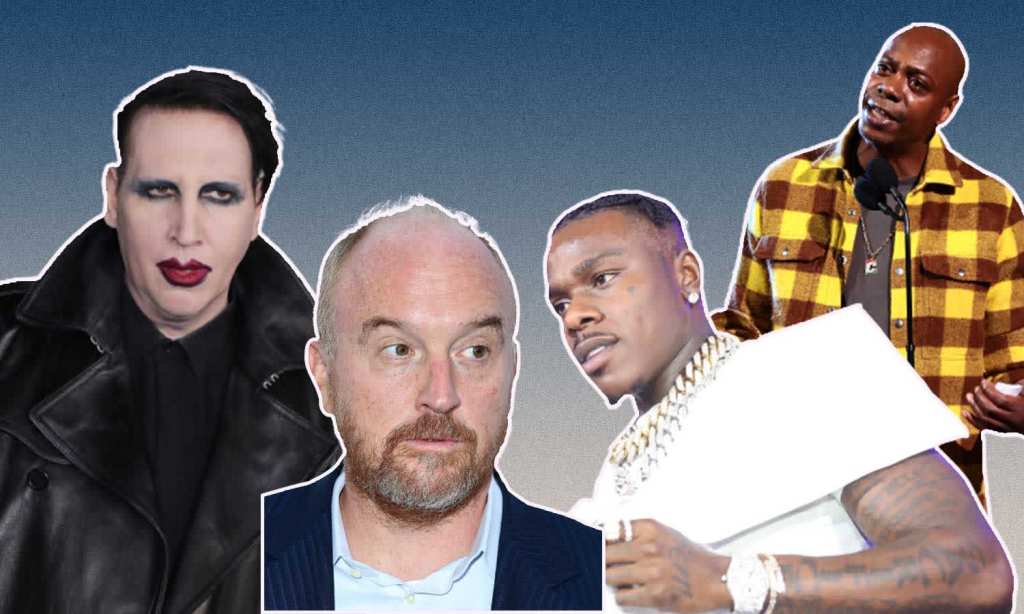The announcement of the nominees for the 2022 Grammy Awards has come with backlash, as several of the contenders have essentially been “cancelled” in recent years.
The nomination of artists such as Marilyn Manson and Louis C.K. pose ongoing questions about separating a person’s work from their alleged wrongdoings, with both men having been accused of sexual misconduct.
Comedian C.K, who is nominated for Best Comedy Album, was accused by several women during the height of the #MeToo movement of asking or forcing them to watch him masturbate over the course of his career. The stand-up acknowledged that there were times in his life that he behaved insensitively although, he believed, consensually, and lay low for just a couple of months before reappearing at New York’s Comedy Cellar. Less than two years later, he was back out on tour.
The allegations made against Manson, who is nominated for his work on Kanye West’s Donda, are even more disturbing, with the singer standing accused of abusing several of his ex-partners and brutally raping one, with multiple women coming forward to share traumatic accounts of their time with him. Manson and his lawyers deny all claims.
So, does the nomination of these two men, particularly in a post #MeToo climate, send the message that, particularly if you are a white male, you can act with impunity and still be rewarded both critically and commercially for your work? Should the Recording Academy have taken more diligent steps to ensure that people like C.K. and Manson were excluded from being nominated, in order to prevent the re-traumatisation of their alleged victims?
The Recording Academy’s CEO Harvey Mason Jr sees no issue with the nominations, telling The Wrap, “We won’t look back at people’s history, we won’t look at their criminal record, we won’t look at anything other than the legality within our rules of; is this recording for this work-eligible based on date and other criteria? If it is, they can submit for consideration.”
There’s something to be said for the rules being the rules, but there is something stronger to be said, I think, for acknowledging that every time a victim sees their abuser celebrated in such a public arena — blessedly free of the emotional scars carried by the people they have hurt — it can feel like being attacked all over again.
It can also send the message that there is no point in reporting such abuses, something which many victims already feel unable to do, because there are little to no consequences for the perpetrators. It says that for every Harvey Weinstein and Armie Hammer, who do suffer public downfalls for their misdeeds, there are always plenty of other sexual predators who will go unscathed.
In a different arena, we also have Dave Chappelle and Da Baby up for Grammy Awards, the former nominated in the Best Spoken Word Album for 8:46, the latter, like Manson, also up for his work on West’s Donda.
Chappelle has recently been at the centre of a huge PR headache for Netflix after the comedian made jokes during his latest stand-up special that many deemed harmful to the transgender community. Netflix’s defence of the comedian and refusal to remove The Closer from the platform, resulted in a mass walkout and protest outside the streaming giant’s Los Angeles headquarters. Chappelle has stood by his jokes and decried “cancel culture” as essentially hysteria bubble-wrapped in pandering.
Rapper Da Baby, also recently came under fire for shouting homophobic remarks to the crowd at the Rolling Loud festival in Miami Gardens, Florida back in July. The performer was condemned for his comments by peers and collaborators such as Dua Lipa, Elton John, Demi Lovato and Questlove.
Again, in a time where the LGBTQIA+ community is asking to be seen, heard, respected and represented, what are the optics of potentially rewarding people who they have expressly and recently said have caused them harm? Not to mention the fact that these two men are already powerful and followed by scores of people who could then be likely to believe and repeat their rhetoric, thus perpetuating the vicious cycle of discrimination. Surely celebrating the professional achievements of these artists bolsters them in their belief that they can say whatever they want, no matter who it hurts, in the name of a joke or a viral performance.
What’s more, if they were to win, they are then given a huge platform on which to accept their accolade and a huge audience in front of whom to do it, thereby posing the possibility that they will take the opportunity to politicise their win and potentially spread more damaging messaging.
However, they are also still artists who have exercised their right to free speech and poured themselves into a body of work they feel passionately about. Does that all get negated in the face of controversy and the calls to be cancelled? Does this entire conversation, in fact, support the argument that cancel culture, itself, should be cancelled?
There is no easy answer for it, but it will be interesting to see the result of the 2022 Grammy Awards and the resulting commentary should any of the aforementioned contenders win. No doubt subsequent award shows will be taking note and will hopefully be ready and willing to learn from what is sure to be a teachable moment.
Read more stories from The Latch and subscribe to our email newsletter.







